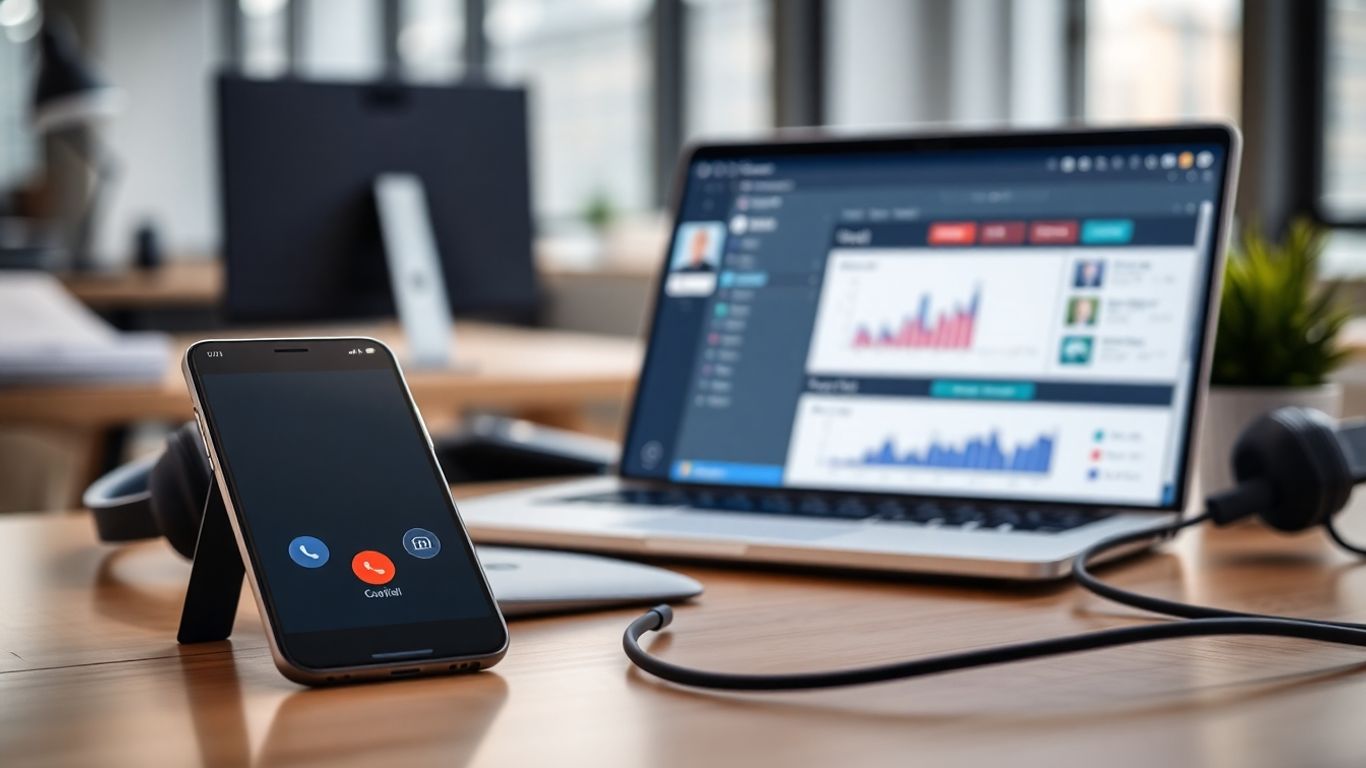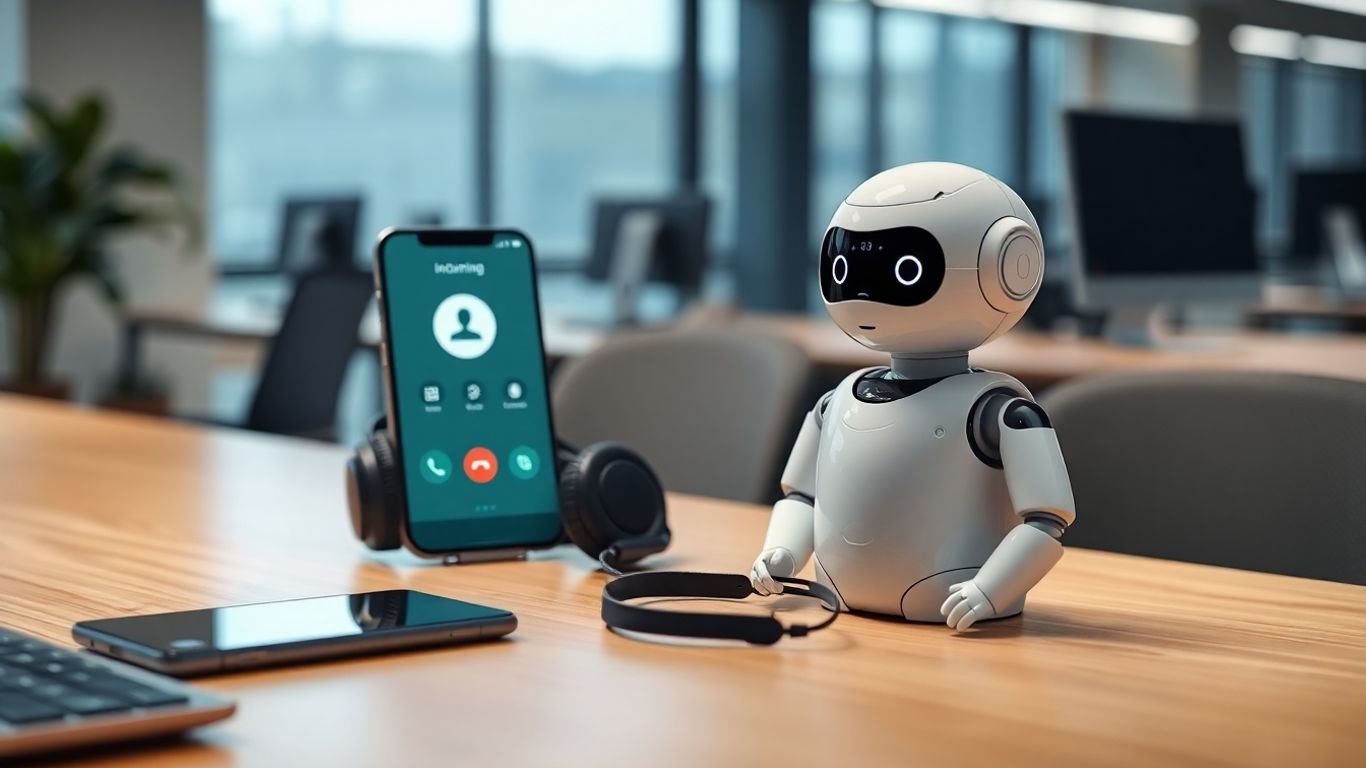Picking the best AI phone answering service 2024 can feel overwhelming, especially with all the new tools out there promising to make your business run smoother. If you’re tired of missed calls, long wait times, or juggling too many phone lines, it might be time to let technology take over. AI receptionists have gotten a lot smarter and now handle everything from scheduling appointments to answering tricky questions, day or night. In this guide, we’ll walk through what’s changed, what to look for, and how to find a service that actually fits your business—not just the latest hype.

AI phone answering services in 2024 are not just about picking up calls—they’re about smart, business-driven communication. A modern solution can understand nuanced questions, handle appointment scheduling, and send documents or promotions by text—all without missing a beat. Real businesses are seeing fewer missed calls and more booked jobs, even after hours.
Some key aspects you’ll notice this year:
There’s no longer a need to worry about busy phone lines or lost messages—AI can juggle unlimited calls and even understand different languages, making it a game changer for a variety of business sizes.
AI phone answering has evolved from a simple tool into a critical part of many companies’ daily operations, bringing structure, availability, and a touch of personality to every customer call.
This year’s services are packed with features built from real business needs.
Here’s a brief overview:
It isn’t just about cost—though AI usually beats a traditional receptionist budget-wise. Companies are jumping on board for a few clear reasons:
Businesses in sectors ranging from healthcare to real estate are seeing fewer missed opportunities and higher productivity with 24/7 coverage and intelligent call management like what My AI Front Desk offers.
If you’re looking for reliability, easy setup, and a noticeable boost to customer interactions, AI answering services stand out as the new standard for 2024.

If you want to pick the right AI phone answering service, you need to know what to look for. It's more than just a robot picking up calls—there are a few key features that really set top services apart in 2024. Let’s break down what matters most when comparing your options.
Modern AI phone answering systems never take a day off. Unlike traditional receptionists, a good AI service will answer calls at all hours—weekends, holidays, and even those odd 2 a.m. emergencies. You won’t have to worry about missed calls or customers leaving voicemails because nobody was available. Here’s why businesses love this feature:
Your business never feels silent or closed—customers get a fast, consistent response every single time.
Some services, like My AI Front Desk, let small teams compete with much bigger companies just by being always-on.
The secret sauce for top AI phone answering in 2024 is all about sounding natural. Gone are the days of robotic, confusing responses. The latest systems can:
Here’s a quick comparison of typical AI capabilities:
This level of technology helps customers feel like they're talking to a real person, not a script.
A true AI phone answering service doesn’t just answer calls—it helps you run your business better. Today, the best platforms:
List of automated workflows you can expect:
It’s basically like having an office manager who never needs sleep and never gets cranky.
Automating these workflows means you can focus on growth instead of being glued to the phone all day.
Modern choices like My AI Front Desk even offer fast setup, so you can go from sign-up to having all your calls taken care of in under five minutes.

Choosing the right AI phone answering service in 2024 is more than checking off a list of features. You really need to think about your business goals, industry quirks, and how reliable a provider is long-term. A smart selection today means fewer headaches tomorrow and a smoother customer experience.
Not every business handles calls the same way. Start by figuring out:
If you’re a medical office, you may want strict privacy and appointment management. If you run a car dealership, quick lead follow-ups might be more important. For some, as evaluating location can improve in-person experiences, matching your phone systems to your workflow matters a lot.
When you know exactly what your callers expect and what frustrates them, it’s easier to spot gaps your next AI service needs to fill.
Certain industries have extra needs or regulations:
Ask possible providers about experience in your field. Get examples or references from similar clients when you can. Here’s a simple table to help compare:
Before you buy, check if the provider:
You’ll also want to ask how they handle bugs or outages, and if they proactively inform you of changes. Slow or unreliable support can cost you way more than a monthly subscription. Don’t be shy about asking for stats on uptime or average response times.
To wrap up, picking the best AI phone answering service is part research project, part gut check. You don’t need every bell and whistle, but if you invest in something that fits your needs, grows with you, and doesn’t drop the ball, you’ll save yourself a lot of stress—and maybe some late-night panic—down the road.
Choosing an AI phone answering service is pointless if it can't work with the tools and apps you already use. The best AI phone receptionists in 2024 make integration easy, so you can connect everything from your CRM to your appointment scheduler without headaches. Here's what you need to consider to avoid nasty surprises down the road.
Your CRM and your calendar are the heartbeat of your business. Modern AI answering solutions can:
No more digging through emails or missed messages because your phone system is on an island.
Zapier is a lifesaver if you don't want to pay a developer. Many AI phone answering services now plug into Zapier, which means you can connect your phone system to 9000+ apps without touching code. Here’s what you get:
Some providers also offer direct APIs – perfect for when your IT team wants custom automations or deep integrations unique to your business.
Integration isn’t a set-and-forget thing. Data flow has to stay accurate or everything falls apart. To keep all your platforms in sync:
When you link your AI receptionist with your existing systems, you save hours every week—not just for you, but for everyone who touches customer calls.
Here's a simple checklist for smooth integration:
If you get this step right, everything else becomes way, way easier. No more manual data entry, no more missed leads, and no more chaos when your business grows (or whenever "system upgrades" rear their ugly heads).
Using an AI receptionist in 2024 isn’t just about answering phones—it’s about making every single caller feel noticed and valued, no matter the hour. Modern AI receptionists meet customers where they are by blending quick responses, memory of past interactions, and genuine-sounding conversations. Let’s break down how these digital front desk agents actually upgrade customer experience in real business settings.
Gone are the days of boring, scripted call answers. AI receptionists now remember details from previous calls, reference caller information, and adapt their greetings to the context of each conversation. Here’s how that works in practice:
What this means for your customers is less frustration and a smoother, more personal touch. For businesses, it’s fewer dropped calls and happier clients. It's simple to set up right out of the gate with tools like AI-powered virtual receptionist for small businesses, making the barrier to entry much lower than you’d expect.
Even the smartest AI won’t solve every caller’s need. The best systems know when to bring in a real person, either for complicated issues or when the customer asks for it directly. Here’s how good handoffs work:
This collaboration between AI and your team reduces wait times, keeps the experience smooth, and makes sure nobody slips through the cracks—especially during busy hours.
Letting AI answer the typical questions and handle scheduling frees up your staff. This leaves humans to focus on solving bigger problems or offering that personal touch when it matters most.
People don’t just want to call—they text, too. Advanced AI receptionists can respond via SMS or even kick off a conversation by text if a caller hangs up. Some typical use cases include:
A quick snapshot:
Integrating these texting features is surprisingly easy with options like My AI Front Desk for phone and text, which means customers feel taken care of, even when your team is off the clock.
In short: AI receptionists aren’t just efficient, they’re reshaping what it means to be "available" to your customers—around the clock, on any channel, and with more context than ever before.

Picking the right AI phone answering service starts with understanding how you'll be charged. Most providers offer a few core ways to pay:
Here's a sample pricing comparison:
To see what these plans do and how they could fit your needs, you can check out this AI receptionist plan breakdown.
AI answering is supposed to save you money, but only if you know how to manage your usage – especially with usage-based billing. Many modern platforms let you:
These controls make budgeting easier, so you don’t get surprised by a busy week or a viral spike.
Cost controls aren’t just about saving money—they help businesses match customer service to real demand and avoid both missed calls and wasted spend.
Let’s be real, AI phone answering services cost a fraction of what you’d pay a full-time receptionist—especially if your business runs after-hours or weekends. But price alone isn’t the only factor. Here are some angles to compare value:
A typical comparison:
Businesses usually notice the investment pays for itself after recapturing just a few missed calls or converting more after-hours inquiries.
If every call you miss could have been a sale or a happy customer, isn’t it worth seeing what AI can do for your bottom line?
Staying responsive when your phones are ringing nonstop is no longer a dream. A big reason businesses turn to AI phone answering services is their ability to keep pace during your busiest moments. Let's break down how these systems handle the pressure without breaking a sweat.
Traditional phone systems had their limits—if too many calls flooded in, some customers were left hanging or sent straight to voicemail. Now, AI-powered receptionists have changed the game:
Here's a quick comparison:
If you want to scale a consulting business effectively, these AI receptionists guarantee that every opportunity is captured—not lost to a busy signal.
Peak periods aren't just about more calls—they push your entire tech stack. AI systems built for scale focus on:
Nobody wants to hear "our lines are busy." AI receptionists make sure your service stays up, even when everyone else is scrambling.
AI answering platforms don't treat every moment the same. During slow periods, they use minimal resources. During spikes, they automatically ramp up. This adaptive approach is how these services keep response times sharp and costs smart:
Why does this matter for your business?
AI phone answering services bring a new level of flexibility and consistency during peak times—making them a practical choice for businesses planning to grow quickly or handle unpredictable surges.
One of the biggest concerns for any business considering an AI phone answering service is how well their data will be protected. Cybersecurity issues can lead to lost trust and even financial penalties. AI services should use strong measures like end-to-end encryption, secured servers, and regular software audits. Don’t settle for providers that only promise basic protections—ask for specifics about storage locations and data deletion policies.
Taking a proactive approach to securing call data can prevent headaches and safeguard your reputation down the road.
If your business handles sensitive information, especially in sectors like healthcare or legal, you can’t ignore compliance standards. For instance, any service managing patient information must meet HIPAA guidelines, while businesses in Europe or serving European customers need GDPR adherence.
Businesses remain responsible for legal use of AI tools. For a solid example of how compliance works in practice, AI Front Desk outlines user responsibilities and legal compliance for their platform.
You’ll want to control exactly who can access call data, settings, and transcripts. A good AI phone service offers flexible permission settings, role-based access, and detailed audit trails. Look for:
Limiting access to critical data reduces your risk if credentials leak or staff leave.
Getting security and compliance right both keeps your business protected and gives customers peace of mind. As AI continues to grow in business communications, picking a provider with reliable security habits isn’t just a bonus—it’s a necessity.
Rolling out an AI phone answering service used to feel like a huge undertaking. Now, the process is quick and much less intimidating—often taking only a few minutes. Simplicity and speed should be at the top of your list when picking a provider. Let’s break down what the setup, training, and ongoing management really look like for modern AI phone receptionists in 2024.
Most providers have streamlined the onboarding process. Here’s what you should expect:
Getting started shouldn’t leave you feeling frustrated—if you’re spending hours on setup or waiting for a technician, something’s off.
AI phone systems work best when they reflect your company’s voice and policies. This part is more about giving the system good information than teaching it rules by hand.
Key steps you’ll take:
Maintenance is where a great provider shines. The last thing you want is your system breaking and leaving customers in the dark.
Ongoing management checklist:
Choosing an AI phone answering platform that’s simple to set up, easy to train, and low-hassle to manage will save you hours—and headaches—week after week.
The best AI phone answering services don’t just answer calls—they turn every interaction into a goldmine of insight. Rich reporting and analytics give businesses the power to make fast, informed decisions about customer service and sales. Let’s break down how you can make the data work for you in 2024.
Modern AI answering solutions provide live dashboards that show:
Here’s an example of what a simple real-time dashboard might track:
You’ll always know at a glance if your customer communications are slipping or improving.
With real-time dashboards, business owners can catch problems instantly and recognize team wins, instead of waiting until next month’s report and missing trends.
AI phone answering services like My AI Front Desk don’t just record the basics—they automatically transcribe every call in clear, searchable text. These transcripts are essential if you want:
Sentiment analysis goes a step further. The AI reviews the tone of conversations and shows whether customers left happy, frustrated, or confused. You don’t need to manually listen to hours of calls to spot issues—just check the analytics.
Reporting is only useful if it leads to action. Here’s how smart teams use their analytics data:
A few ways reporting can drive changes fast:
Choosing an AI phone answering service with deep analytics capabilities—especially one that integrates right into your CRM or business dashboard—means you’re not flying blind. You’re using every call as a stepping stone toward smarter business growth.
It’s one thing for a business to say it never misses a call, but seeing it in practice is something else. For example, a local plumbing company saw chaos every winter—calls would go unanswered during the busiest hours, which led to lost jobs. They set up an AI phone answering service that handled every single incoming call and sent job details directly to the scheduling system. Within four weeks, their missed calls dropped to zero and their booking volume increased noticeably. The owner didn’t have to hire another person, saving both money and headaches. Similar stories are popping up everywhere—businesses of all sizes saying goodbye to voicemail black holes.
SMBs that rely on a steady stream of new jobs find the difference between missing a call and landing a client can be huge—AI ensures they never fall through the cracks anymore.
Lots of businesses, especially those that book in advance—think clinics, salons, construction firms—struggle with double booking and no-shows. A construction company decided to try My AI Front Desk and let the AI handle all appointment calls. The results? The AI booked appointments accurately, checked calendar openings in real time, and even sent reminders via text. Human staff got more time for their core work, and customers reported less confusion over scheduling.
Three clear benefits stood out:
An e-commerce retailer was flooded with calls: order updates, tracking, return questions. Instead of putting customers on long holds, their virtual receptionist now answers common questions right away, provides order info, and even sends follow-up texts. Suddenly, the human team could focus on the truly tough support situations. Customer feedback was almost 100% positive, and response times went from minutes to just seconds.
For growing companies in 2024, AI receptionists aren’t just a backup—they’re an upgrade, letting businesses keep up with demand and actually improve service without adding headcount.
See how businesses just like yours are winning with Frontdesk in 2024! These real-life case studies show how our AI receptionist is making a difference. Ready to make your calls easier? Check out our website to learn more and get started today.
Picking the best AI phone answering service in 2024 doesn’t have to be overwhelming. Start by figuring out what your business really needs—think about your call volume, the types of questions customers ask, and how much you want to automate. Compare a few top providers, look for features that actually matter to you (like integrations or after-hours support), and don’t be afraid to test a couple out before committing. Remember, the goal isn’t just to save money or sound high-tech—it’s to make sure your customers always feel heard, no matter when they call. With the right setup, you’ll spend less time worrying about missed calls and more time focusing on what you do best. AI isn’t perfect, but it’s getting better every day, and for most businesses, it’s already a game changer. Try it out, tweak as you go, and see how much smoother your days can run.
An AI phone answering service is a virtual assistant that answers phone calls for your business using artificial intelligence. It can talk to customers, answer questions, schedule appointments, and even send texts—just like a real person.
An AI receptionist works 24/7, never takes breaks, and can handle many calls at the same time. It uses smart technology to understand and respond to callers, while a live receptionist is a real person who can only handle one call at a time and may not be available after hours.
No, most AI phone answering services are easy to set up. You usually just tell the system about your business, set your preferences, and start forwarding calls. Many services can be up and running in less than five minutes.
Yes, many AI answering services can connect with your calendar, CRM, and other business tools. This helps keep your appointments, customer info, and call records in sync without extra work.
Most modern AI systems sound very natural and can have conversations just like humans. Some customers may not notice, but you can choose to let people know they are speaking with a virtual assistant if you want.
Prices vary, but AI phone answering services are usually much cheaper than hiring a full-time receptionist. Some start at around $99 per month, and you can choose plans based on your needs and call volume.
Yes, top AI phone answering services use strong security to protect your data. They follow privacy rules like GDPR and HIPAA to keep customer information safe and private.
Many providers offer a free trial, so you can test the service and see if it fits your business before making a commitment.
Start your free trial for My AI Front Desk today, it takes minutes to setup!








